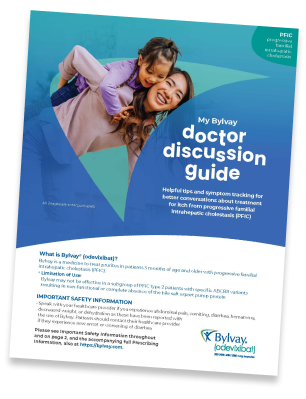Itch from PFIC is more than normal itching
If you or your loved one experiences itching from PFIC, you know that it can be a challenge to deal with. It may be frequent, deep, and frustrating.
More than 75% of people with PFIC experience itch
Your doctor may describe itch using this term. Pruritus (pronounced proo-rahy-tuhs) is a medical term for itching.
How PFIC affects the liver
- Bile acids don’t drain properly out of the liver to the small intestine.
- Bile acids build up to a level that may be harmful to the liver.
- Excess bile acids spill into the bloodstream.
The buildup of bile acids in the liver and the bloodstream may be the cause of itch (pruritus) in PFIC.
The buildup of bile acids in the liver and the bloodstream may be the cause of itch (pruritus) in PFIC.
Bile acids are created in the liver. Bile acids aid in digestion, breaking down food and helping the body absorb fat-soluble vitamins.
The ileal bile acid transporter, or IBAT, recycles bile acids back into liver from the intestines.
Signs of itch aren’t always obvious
Babies and young kids may
- Rub themselves or rub against objects
- Kick their legs and be restless
- Cry, be irritable and fussy
- Struggle to fall and stay asleep
Older kids and adults may
- Feel embarrassed
- Feel impacts on self-esteem
- Feel effects on mood
- Struggle to fall asleep, or feel tired
Make sure to talk to your doctor about all the ways itch impacts you or your child
Discover how Bylvay works to help reduce itch from PFIC
It’s important to talk to your doctor about the potential impact of itch
Disruptions due to the itch from PFIC affects each patient and caregiver differently.
Use the doctor discussion guide to track symptoms and have better conversations about the impact of PFIC with your doctor.
Get started tracking your symptoms with the itch tracker and itch-related sleep tracker and share the results with your doctor.

